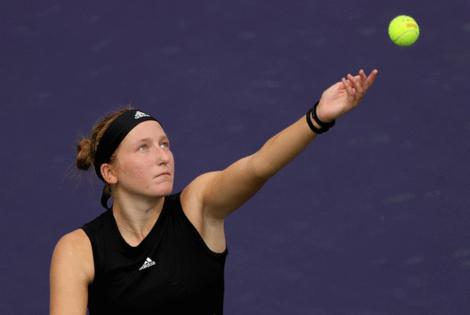Luke DeCock: UNC tennis star's prize-money lawsuit against the NCAA gets big boost in court
Published in Tennis
RALEIGH, N.C. — Not only is Reese Brantmeier headed back to the U.S. Open, it appears the North Carolina tennis star’s lawsuit against the NCAA is about to get a big boost.
After a hearing in Greensboro last week, Federal judge Catherine Eagles issued an order Tuesday indicating she will certify Brantmeier’s lawsuit as a class action, allowing Brantmeier to represent all college tennis players in her attempt to allow them to keep prize money they win at non-NCAA events.
Specifically, the lawsuit “seeks to enjoin the NCAA from enforcing certain eligibility rules which contain certain limits on the amounts of prize money that tennis student-athletes (both pre-college and college) can accept in non-NCAA tennis tournaments, if they seek to maintain their eligibility to compete for NCAA Division I tennis teams.”
In October 2024, Brantmeier failed to get class certification for all individual sports, but then modified her lawsuit to include only tennis and added former Texas tennis player Maya Joint as a co-plaintiff. Eagles’ text order said she was “highly likely” to grant Brantmeier’s motion to certify Division I tennis players as a class, asking Brantmeier’s lawyers to prepare a draft ruling by no later than July 29.
“We’ve always been pretty optimistic about the righteousness of our case,” said Raleigh lawyer Jason Miller, part of Brantmeier’s legal team. “If you talk to anyone on the street, a lawyer or not, any sports person, it doesn’t make sense that the NCAA allows certain athletes to retain prize money. It allows many athletes seven-digit NIL payments. They’re now receiving direct payments from schools.
“It’s hard to explain to folks why the NCAA says it’s acceptable to pay a wide receiver $3 million a year and he’s still an amateur in the view of the NCAA, but somehow Reese as a 16-year-old retains $50,000 in prize money from the U.S. Open and she’s a professional. It’s an arbitrary distinction that never made a lick of sense to us. I don’t think it makes sense to sports fans around the country. I don’t think it makes sense to judges when the NCAA makes its arguments.”
Miller added, “We have no problem with these athletes getting what they get. But it’s such an arbitrary line to draw to say the Reese Brantmeiers of the world are the odd woman out.”
The NCAA did not respond to a request for comment Wednesday. In a court filing, it argued that “the actions of the NCAA do not unreasonably restrain trade, but are lawful, justified, and pro-competitive given the need for institutional members of the NCAA to prevent pay-for-play, including by imposing uniform rules of eligibility regarding non-NCAA competition and student-athlete compensation.”
While Eagles’ order appears to pave the way for class certification and trial, the two sides are also scheduled to undergo court-ordered mediation where the NCAA could seek a settlement, but its legal strategy under both past president Mark Emmert and current president Charlie Baker has been to hold the line wherever possible, which led to a historic Supreme Court loss in the Alston case.
Earlier this year, however, the NCAA settled the House lawsuit to avoid a trial, which led to $2.8 billion in back pay for former athletes and a new revenue-sharing model instituted this month where schools that opt into the settlement can pay athletes $20.5 million directly, among other provisions negotiated between the House plaintiffs, the NCAA and the power conferences.
Brantmeier lost her first semester of eligibility at North Carolina in 2022 after a dispute with the NCAA over whether the expenses she incurred while competing in the U.S. Open a year earlier were “actual and necessary,” a bizarre discussion even at that point considering the NCAA allowed Olympic athletes to collect medal bonuses and athletes were allowed to capitalize on their name, image and likeness.
That was above and beyond forfeiting the $49,000 in prize money she won in 2021 just to play in college at all, but her battle with the NCAA was just beginning. She’s not alone, even locally: Brantmeier’s former UNC teammate Fiona Crawley and former N.C. State star Diana Shnaider both had to forfeit prize money as well.
“Reese from the very beginning has said this is not for her but for future student-athletes,” Miller said. “This would allow her to pursue this case on behalf of not only current student-athletes and former student-athletes over the last four years that have been damaged but also student-athletes who are not enrolled, that are in high school, who may find themselves in this position.”
Meanwhile, Brantmeier is headed back to the U.S. Open in doubles next month after a season that saw her earn ACC player of the year and all-America honors in singles and doubles despite missing the fall of 2024 with a second serious knee injury.
Brantmeier and UNC doubles partner Alanis Hamilton won a qualifying tournament in Orlando in June for NCAA players to claim a wild card into the main doubles draw in New York, starting August 28.
“I hope people see that Reese and Maya have so many things going on,” Miller said. “Maya’s so busy all over the world playing tennis. Reese is still in school, keeping up with her schoolwork. They’re incredibly busy athletes at the highest level of their sport, but they’ve put in lots of time and lots of effort pursuing this case because they believe it’s important to change these rules.”
____
©2025 Raleigh News & Observer. Visit newsobserver.com. Distributed by Tribune Content Agency, LLC.







Comments